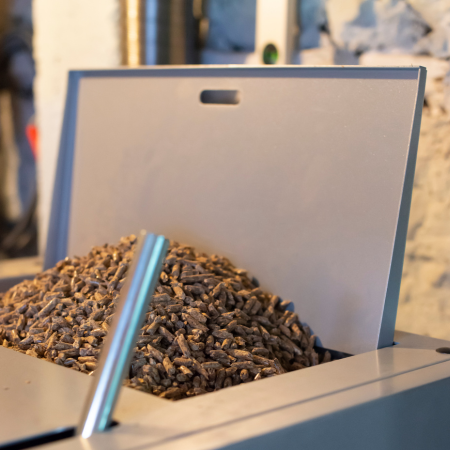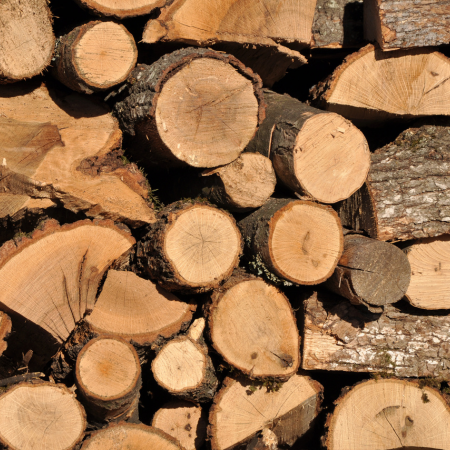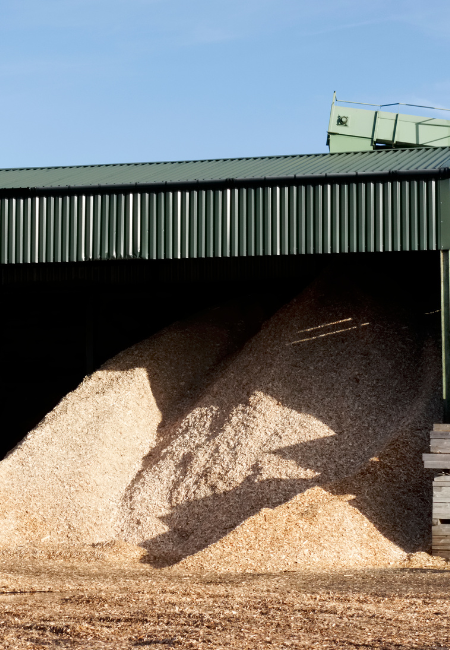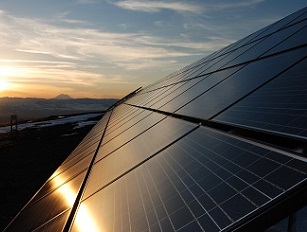Biomass Boilers provide a clean, renewable source of energy that an increasing number of homeowners are switching to, thanks to the continuing energy crisis and global warming concerns.
Biomass Heating takes advantage of sustainable biomass fuel derived from animal waste, plants, or wood fuel to generate heat for your property or buildings.
Providing an efficiency rating of 80%-91%, Biomass Boilers are without a doubt considered one of the most viable renewable heating options. They provide performance compared to that of typical fossil fuel boilers, making them ideal for consumers looking for a renewable and efficient heating alternative.
Our renewable energy experts have weighed up the pros and cons of Biomass heating, taking an in-depth look at the carbon impact, cost of biomass, features, and everything else you need to know when considering biomass heating for your property.

Biomass Heating: How it works
Biomass Boilers are the most common form of Biomass Heating that works the same way as traditional boilers, but instead, they burn sustainable fuel made from organic materials to produce heat.
- First of all, the organic materials (such as wood pellets or chippings) are fed into a fuel store. Typically an auger and agitator will sift the wood fuel smoothly from the store to the combustion chamber in the boiler, however this will depend if the boiler is an auto fed model. If the Biomass Boiler is hand fed, just like the Windhager Firewin range won't require an auger as the biomass fuel will need to be manually added to the fuel box.
- Secondly, whenever there is a demand for heat, a process called gasification starts taking place. The wood fuel in the combustion chamber is then set alight automatically, which subsequently starts producing gases.
- Next, secondary combustion occurs when the air is brought into the chamber that mixes with the gases produced; this then gets burnt off, generating temperatures of up to 1,200˚C.
- Lastly, the Biomass Boiler will contain a heat exchanger, passing through the hot gases and heating the water inside. The heated water will then be distributed away from the boiler, providing heat in the property or office building.
It is important to note that most Biomass Boilers will require a buffer tank, however there are some models, such as the Windhager BioWIN range where a buffer tank is not required.
Best Biomass Boiler for my home?
Suppose you are considering a Biomass Boiler for your property; it's essential to remember that the type of boiler that will work best for you will be determined by a few factors, such as the size of your property and the climate in your area.
Simply put, the bigger your property is, the larger the Biomass Boiler you will require to keep up with the demand for heat, water and electricity. The climate affects the size of the recommended boiler for your home. Cooler temperatures require a larger boiler to generate enough heat, while warmer weather can make a smaller biomass boiler more suitable.
We recommend the Windhager BioWIN 2 Touch range of Biomass Boilers. These boilers are a great all rounder that can effortlessly fit into small, restricted spaces. They come equipped with an auto-feed system, making them convenient to use. Homeowners with both large and small properties can benefit from their various power outputs.
Pros of Biomass Boilers
1. Renewable Energy
Biomass Boilers use a renewable energy source that can be replenished quickly over a short period of time. This makes biomass fuel more sustainable than other non-renewable fossil fuel boilers, such as oil.
2. Lower Emissions
Biomass Boilers will produce fewer carbon emissions than other traditional heating systems. This is because the biomass fuel used is burned more efficiently, which in turn will create fewer pollutants, making it a great way to offset your carbon footprint all for greener living.
3. Cost-effective
Without a doubt, Biomass boilers are a lot more cost-effective than other traditional boilers. The price for biomass fuel alone, such as wood pellets, is considerably lower compared to gas and oil. The cost can also alter depending on the type of biomass fuel used and the price of installation but generally will save you money overall on your heating bills.


4. Versatility
Biomass Boilers can not only provide heating to homes and other small offices but can also generate on-demand hot water and electricity. A primary heat source is used, but Biomass Boilers can also use a backup heat source in contrast with other heating systems, such as solar thermal or geothermal.
5. Efficiency
The efficiency of Biomass Boilers can vary on several factors, such as the type of biomass fuel used, the boiler size, and regular boiler maintenance. Biomass fuels all have different energy densities; for example, wood pellets have a higher energy density than wood chips, meaning that wood pellets will deliver more heat per unit of energy than wood chips.
The efficiency will also vary depending on the size of the boiler because boilers with a larger heat exchanger will be more efficient compared to boilers with a smaller heat exchanger.
Keeping your Biomass Boiler regularly maintained will improve its overall efficiency. This is very important because, over time, they can become clogged with soot and ash, which can reduce their overall efficiency and could eventually lead to more significant problems.
Cons for Biomass Boilers
There are many advantages to using biomass boilers, including lower emissions, cost savings, and environmental benefits. Even so, there are some disadvantages to be aware of, including:
1. Initial cost
The initial cost and installation of Biomass boilers will vary, counting on the size and make of the boiler; however, in general, they are more expensive to purchase and install in contrast to traditional fossil fuel boilers. There is however a solution, by signing up to the Renewable Heat Incentive scheme - you will be able to help offset the initial cost of installation
2. More maintenance
As mentioned previously, Biomass boilers will require more frequent upkeep in comparison to traditional fossil fuel-fired boilers. This is because the biomass fuels used to produce heat will leave leftover waste behind, such as ash and soot, which can build up and reduce the boiler's efficiency.


3. Storage space
It's no secret that a biomass heating system will require more storage space than traditional central heating systems. This is because a substantial area is needed for the fuel store and chimney, whereas the boiler can typically be installed in an outhouse or garage.
The space required will also vary depending on the type of boiler; here is a list of boilers available and the recommended size required.
Wood pellet boiler - Up to 100 kW (10-15 square feet)
Wood chip boiler - Up to 200 kW (15-20 square feet)
Agricultural waste boiler - Up to 300 kW (20-25 square feet)
4. Fuel Shortage
Depending on your area, it can be tricky to get a steady supply of biomass fuel because the energy density of biomass is low, and the acquisition of land for harvesting and storage is complex.
This is putting a considerable amount of pressure on the transportation sector because - the transportation of damp biomass from the plantation to the production site can be unfavorable, which in turn will become increasingly costly with distance.
5. Pollution
Although Biomass Boilers are more efficient than traditional boilers that produce fewer emissions, they can still generate greenhouse gases - mainly depending on conditions.
While it is true that biomass boilers are more sustainable - they can still produce carbon monoxide - so using a well-designed combustion control system, responsibly sourced local fuel, and correctly operating the boiler temperature can significantly reduce the emission levels even further.
To summarize, using biomass heating as a way to warm homes and offices is a practical choice. This heating source is renewable, effective, and has low emissions. Despite its benefits, it's crucial to consider the advantages and disadvantages before making the investment.
If you are considering using Biomass energy in your home or business, contact our Energy Efficiency experts at City Plumbing. We are ideally placed to advise you on the best answers of low-carbon technologies to help you create a greener and more energy-efficient property.
Other articles

Solar Panels FAQs - Your Common Questions Answered
31 May 2023 ・ 7 mins

Solar Recycling Scheme - Everything you need to know
27 Jul 2023 ・ 5 mins

Solar Panel Installation Best Practices
15 May 2023 ・ 6 mins

How to become a renewable energy engineer
03 Mar 2022 ・ 7 mins



